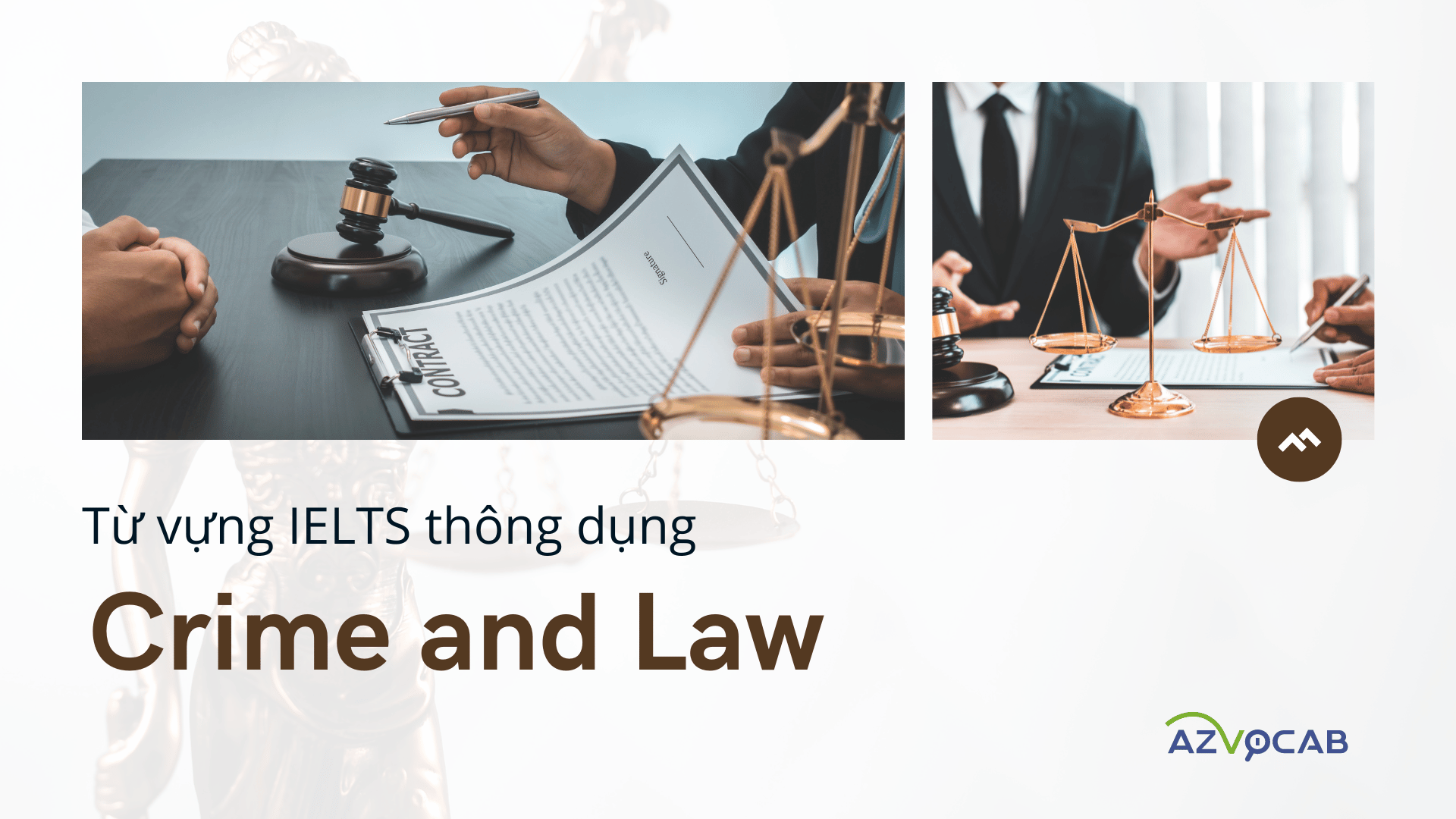90+ từ vựng chủ đề Crime and Laws thông dụng cho kì thi IELTS
28 Tháng Mười Một, 2022Từ vựng IELTS thông dụng

Từ những bộ sách hay nhất cho việc ôn thi IELTS, azVocab đã tổng hợp được hơn 90 từ vựng phổ biến nhất thuộc chủ đề Crime and laws cho kì thi IELTS.
Các từ vựng này đều có thể sử dụng cho cả 4 kỹ năng Reading, Listening, Speaking và Writing. Những ví dụ được azVocab lựa chọn kĩ lưỡng trong từng ngữ cảnh cụ thể ở các bài thi IELTS. Điều này sẽ giúp các bạn biết cách sử dụng từ trong ngữ cảnh, tăng tính hiệu quả của việc học từ.
1. Từ vựng liên quan tới các hành vi phạm tội
| arson (n.) – sự phóng hỏa | Arson is a crime against property, but sometimes people can get hurt as well. |
| burglary (n.) – việc ăn trộm | Several men were questioned by police yesterday about the burglary. |
| crime (n.) – hành động phạm tội; tội ác | Very young children only get involved in crime if they are left alone without any supervision. |
| crime rate (n.) – tỉ lệ phạm tội | In the area where I live, the crime rate has increased significantly in the past few years. |
| criminal (n.) – tội phạm | Criminals need to be trained and rehabilitated so that they can enter the workforce. |
| fraud (n.) – tội lừa đảo, việc lừa đảo | Despite the convenience of shopping or banking online, there is the problem of internet fraud. |
| inequality (n.) – sự bất bình đẳng | Research also shows that income inequality correlates to property crime. |
| intent (n.) – ý định | It is our responsibility and duty to protect young people from those with evil intent. |
| intrusion (n.) – sự xâm phạm | In some countries, the police can enforce laws against crossing the street at the wrong place by imposing a fine. Laws like this are passed simply to keep us safe and some see them as an intrusion on our privacy. |
| kidnapping (n.) – việc bắt cóc | The news of the kidnapping was blacked out until the police could find the child. |
| motive (n.) – lý do, động cơ | One theory suggests that property crime depends on criminal motives and opportunities to perpetrate crime. |
| mugging (n.) – cướp | I’m not afraid of getting stabbed, it’s more muggings, you know, when people grab your bag, stuff like that, I think because of the rising unemployment. |
| murder (n.) – tội giết người | Nobody could claim that social problems such as murder and traffic deaths resulting from drink-driving are to be accepted as minor issues. |
| offence (n.) – sự phạm tội, tội ác | The offenders involved were exactly matched according to the type of offence they had committed, their prior prison experience and the number of prior appearances in court they had had. |
| organised crime (n.) – tội phạm có tổ chức | The extent of the phenomenon is becoming increasingly alarming, and organised crime is increasingly involved. |
| peer pressure (n.) – áp lực đồng trang lứa | I think that there’s also been an increase in juvenile crime. Partly I think this is through peer pressure – young people are very much influenced by what their friends think of them, and it’s become cool to act like a gangster. |
| petty crime (n.) – tội nhẹ | The children might only start with petty crimes but, if they fall in with the wrong crowd and become delinquent, then this can escalate to more serious crimes like robbery or car theft. |
| pickpocketing (n.) – việc móc túi | Petty theft and pickpocketing are becoming increasingly common in the city centre. |
| robbery (n.) – cướp, trộm | We are bombarded on an almost daily basis with stories of minorities engaging in crimes such as robbery, murder and rape. |
| smuggling (n.) – sự buôn lậu | The murdered man is thought to have been involved in drug smuggling. |
| swearing (n.) – lời chửi rủa | Some people are offended by swearing on television. |
| toxic waste (n.) – chất thải độc hại | I think dumping toxic waste should be made a criminal offence. There is a title to deter people from doing this at the moment. |
| vandalism (n.) – sự phá hoại | You only need to look around the streets to see all the graffiti and vandalism. |
| violation (n.) – sự vi phạm, xâm phạm | Traditionally, crime is considered an offence, a violation of public rules or laws. |
| violence (n.) – sự bạo lực | The sale of drugs is organised by armed criminal gangs who illegally traffick drugs and control their business with extreme violence. |
| criminal (adj.) – phạm tội | Government funding for drug and alcohol rehabilitation programmes would help reduce dependency on stimulants and the need for the criminal activity that surrounds them. |
| drug-related (adj.) – liên quan đến chất gây nghiện | Drug-related crime does not end there; drug users often steal to fund their habit, resulting in further acts of petty crime. |
| evil (adj.) – xấu xa, ác độc | Police described the killer as ‘a desperate and evil man’. |
| extreme (adj.) – cực kì | The sale of drugs is organised by armed criminal gangs who illegally traffic drugs and control their business with extreme violence. |
| guilty (adj.) – có tội | Being guilty of a criminal act usually involves some form of conscious evil intent or recklessness. |
| harsh (adj.) – nhẫn tâm, tàn nhẫn | In conclusion, crime is a major issue, but cracking down on offenders with a harsh penal system is not the only way. |
| hostile (adj.) – thù địch, chống đối | The prisoner eyed him in hostile silence. |
| violate (v.) – vi phạm, xâm phạm | The non-profit Center for Science in the Public Interest has filed suit against the FDA, arguing that the new program violates the 1990 Nutrition Labeling and Education Act, which mandated a higher level of scientific agreement for marketing the health benefits of ingredients. |
2. Từ vựng liên quan tới điều tra, xét xử
| authority (n.) – chính quyền | The social system generally consists of an administrative authority that formally deals with crime and a force of representative officers to enforce the laws and act on behalf of society. |
| community service (n.) – phục vụ cộng đồng | The study suggests that community service may be just as suitable a form of punishment for minor offences. |
| judge (n.) – quan tòa, thẩm phán | The judge will pronounce the sentence on the defendant this afternoon. |
| jury (n.) – bồi thẩm đoàn | A jury should not interpret the silence of a defendant as a sign of guilt. |
| lawyer (n.) – luật sư | If a person is charged with a crime they did not commit, it’s my job as a criminal lawyer to defend them. |
| prosecutor (n.) – người khởi tố | Prosecutors have launched a criminal investigation into the firm’s accounting practices. |
| the accused (n.) – bị cáo | The accused protested her innocence. |
| victim (n.) – nạn nhân | If you are a victim of a violent crime, it can take years to get over it. |
| compelling (adj.) – hấp dẫn, thuyết phục | Forensic evidence makes a suicide verdict the most compelling answer to the mystery of his death. |
| impartial (adj.) – công bằng, không thiên vị, vô tư | The jury must be objective and impartial at all times. |
| impracticable (adj.) – không khả thi, không thực hiện được | The changes to the tax system proved impracticable as they were impossible to enforce. |
| innocent (adj.) – vô tội; ngây thơ | He firmly believes that she is innocent of the crime. |
| intentional (adj.) – cố ý, có chủ đích | She felt she was a victim of intentional discrimination. |
| action (n.) – hành động | Children should be taught to accept the consequences of their actions. |
| evidence (n.) – bằng chứng | The police have found no evidence of a terrorist link with the murder. |
| investigation (n.) – sự điều tra, cuộc điều tra | The government has agreed to launch an official inquiry investigation into the matter. |
| investigative (adj.) – mang tính điều tra nghiên cứu | An investigative report showed the drug to be ineffective in fighting the disease. |
| prove (v.) – chứng minh | The lawyer tries to prove the accused is innocent. |
| capital punishment (n.) – tử hình | Public opinion was in favour of bringing back capital punishment. |
| fine (n.) – tiền phạt | I was given a parking fine again yesterday. It’s costing me a fortune. |
| imprisonment (n.) – sự tống giam | She was sentenced to five years’ imprisonment. |
| life sentence (n.) – tù chung thân | There were a total of 17 people found guilty, including one life sentence in prison. |
| lenient (adj.) – (hình phạt) nhẹ, khoan dung | They believe that judges are too lenient with terrorist suspects. |
| imprison (v.) – bỏ tù | At the moment the only form of punishment we have is to either fine people for petty crimes or imprison them for more serious criminal offences. |
| jail (v.) – bỏ tù, tống giam | He was jailed for four months for drink-driving. |
3. Từ vựng liên quan tới pháp luật
| consequence (n.) – hậu quả, kết quả | If people commit crimes, then they should be punished and made to accept the consequences of their actions. |
| prevention (n.) – sự ngăn chặn | We also need to focus more attention on crime prevention. |
| prison (n.) – nhà tù | It is true that the crime rate is increasing in many areas of the world. Many governments react to this problem by building prisons to contain criminals. |
| convict (n.) – tù nhân | They say perhaps it was an escaped convict who got into the house while Joe was out. |
| prisoner (n.) – tù nhân | Some people feel that this system is not working. Perhaps this is because prisoners mix with other criminals when they are in jail. |
| protection (n.) – sự bảo vệ, bảo hộ | This particular theory relates an increase in crime rate to an increase in crime opportunity and a decrease in protection. |
| punishment (n.) – hình phạt | To solve these problems, governments can either focus on draconian punishments, or improve employment opportunities, invest in good housing projects and tackle drug and alcohol abuse. |
| recklessness (n.) – sự liều lĩnh, khinh suất | The deaths were the result of criminal recklessness. |
| respect (n.) – sự tôn trọng, lòng tôn trọng | But I do think that, nowadays, people generally have less and less respect for the rules of society. |
| law-abiding (adj.) – tôn trọng luật pháp, tuân theo luật pháp | Many law-abiding citizens believe that our existing laws are just not tough enough and do not act as enough of a deterrent against crime. |
| non-violent (adj.) – phi bạo lực | They are changing the law to help protect non-violent offenders from life sentences. |
| offensive (adj.) – có tính xúc phạm, sỉ nhục | Swearing is offensive but is not a crime. |
| punishable (adj.) – có thể bị trừng phạt | In the winter of 1812, the Frame-Breaking Act was passed, making the destruction of factory equipment a crime punishable by death. |
| random (adj.) – ngẫu nhiên | There is always a victim somewhere, even if that victim is a company and its owners. And victims often feel the effects of a crime for many years, whether the attack is planned or random. |
| strict (adj.) – nghiêm khắc, khắt khe | The laws in this country are rather strict – even chewing gum is banned. |
| tough (adj.) – nghiêm ngặt | Many law-abiding citizens believe that our existing laws are just not tough enough and do not act as enough of a deterrent against crime. |
| unintentional (adj.) – không cố ý, vô ý | In unintentional cases, such as crimes committed by children or the insane, the criminal is not usually punished in the same manner as in intentional crime. |
| victimless (adj.) – không có nạn nhân | Some people believe that non-violent crimes or so-called victimless crimes such as fraud should be punished less. |
| abolish (v.) – thủ tiêu, bãi bỏ, hủy bỏ | In recent years there has been a move to abolish laws which were deemed to be too harsh or strict and to reduce the punishment for non-violent crimes, such as those against property. |
| control (v.) – kiểm soát | For example, the sale of drugs is organised by armed criminal gangs who illegally traffic drugs and control their business with extreme violence. |
| counter (v.) – chống lại | Extra police have been moved into the area to counter the risk of violence. |
| deter (v.) – ngăn cản, cản trở | In fact, these results are consistent with a growing body of evidence suggesting that prison either does nothing to deter offenders or actually increases the risk of re-offending. |
| enforce (v.) – làm cho có hiệu lực; thúc ép | It’s difficult to believe that reducing punishments will help to combat crime. It goes without saying that laws against serious crimes should be strictly enforced. |
| monitor (v.) – giám sát | Punishment or other sanctions result from the violation of these laws, and the social system for monitoring and enforcing public rules or laws are put into action. |
| obey (v.) – tuân theo | Focusing on petty crimes in this way can also cause people who generally obey the law to resent the police rather than respect them for what they do. |
| offend (v.) – xúc phạm | Neither of these volunteers offended his hosts with words. But both of them were unaware of what they had communicated through their non-verbal behaviour. |
| perpetrate (v.) – phạm vào, gây ra (tội) | One theory suggests that property crime depends on criminal motives and opportunities to perpetrate crime. |
| protect (v.) – bảo vệ | We can do this by making sure that our property is protected and also by improving the conditions for the poorer people in our society. |
| punish (v.) – phạt | The majority of us would agree that criminals, especially dangerous ones, should be punished. |
| reassure (v.) – trấn an | The police have reassured witnesses who may be afraid to come forward that they will be guaranteed anonymity. |
| resent (v.) – bực tức, phẫn nộ | We resent these insinuations that we are not capable of leading the company forward. |
| support (v.) – hỗ trợ, giúp đỡ | Passing laws that require companies to support women’s needs would show that society values women’s contributions, both at home and at work. |
| abide by (phr.v) – tuân theo, chấp nhận | We also need to focus more attention on crime prevention and educating young people to abide by the law. |
| deal with (phr.v) – giải quyết | Crime can, of course, be dealt with by toughening criminal laws and introducing longer custodial sentences for persistent criminals, but some of the best ways to deal with a crime may be to deal with the social causes. |
| deterrent (n.) – cái ngăn chặn | Tougher prison sentences may act as a deterrent to other would-be offenders. |
Từ vựng chủ đề Crime and Law rất đa dạng và phong phú nhưng không quá khó ghi nhớ, các bạn hãy chia nhỏ chủ đề ra để học sẽ hiệu quả hơn nhé. Hãy theo dõi thêm các bài viết tổng hợp từ vựng thông dụng IELTS ở các chủ đề khác trên azVocab nhé.





